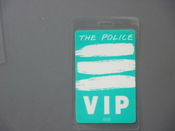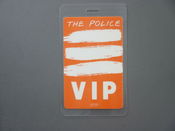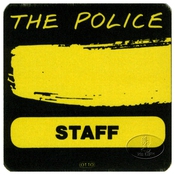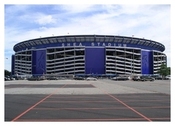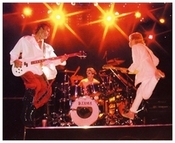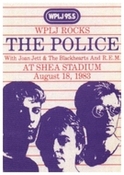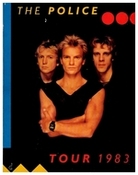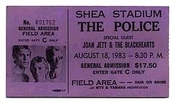
Synchronicity
Aug
18
1983
New York City, NY, US
Shea Stadiumwith Joan Jett & the Blackhearts, R.E.M.
The Police collar 67,000 at a soggy sellout in N.Y...
Two brief, but heavy downpours didn't keep the Police, the hottest rock group in the USA, from rolling into Shea Stadium Thursday in the midst of its record-setting tour.
Deedee Lynn, 22, who had driven up the night before with friends from Tin Falls, N.J., summed it up for the more than 67,000 fans: ''Twenty years from now, it will be like saying, 'I saw Elvis Presley.' ''
The mostly teen-age crowd - th_fastest sellout in Shea Stadium's history - frolicked in the rain and jammed the arena to hear the trio. Hundreds more swarmed outside hoping to get in.
Prepared for 75,000 fans, a security force of 1,200, including about 850 New York City police, was at work. But they reported a remarkably calm night, with no early arrests.
Only scalpers, selling counterfeit tickets, dampened spirits. ''It stinks,'' said Karen Fredrickson, 20, who drove 2? hours from upstate New York with friends. She paid for a counterfeit ticket. ''I've got to sit outside and wait while my friends are having fun.''
The sellout reception was the radical change for the band. Four years ago the closest they could get to New York City was upstate Poughkeepsie, where their concert drew six people.
More proof the band is tops:
'Synchronicity', the trio's fifth album, shot to the top of the charts in three weeks and has held the No.1 spot for five. It has sold more than 4 million copies in two months. Its first single, Every Breath You Take, now in its seventh week at No. 1 hit the top in just six weeks.
Their tour has been the biggest since The Who's last a summer. Two weeks ago, the Police drew 65,000 fans - another 10,000 waited outside - to Foxboro Stadium near Boston. Coming up: two sellouts at the Capital Centre, near Washington, D.C. Each concert is being taped by MTV and the entire tour will be aired on the cable music channel, an MTV spokeswoman said.
The group has received nationwide media attention, with stories in Time, News week and Rolling Stone.
(c) USA Today by Miles White
Police at Shea: super sound and a televised tea break...
''The first time I ever came to New York, we got into a car at the airport and the driver took us to the Bowery and a placed called CBGB,'' Sting said as he surveyed the 70,000 Police fans who packed Shea Stadium. ''After that, we played the Bottom Line, then the Ritz and the Palladium. When we came back again, we played Madison Square Garden - twice.'' The bassist paused, scanning the enormous stadium with undisguised awe. ''And now we're here. Makes you stop and think, doesn't it?''
It does. Every ticket for the event was sold out in a little over five hours. At the time of the show, the newest album, 'Synchronicity', was perched comfortably at #1 on the album chart and showed no sign of budging. But nearly 18 years to the night that the Beatles peered up into those same mile-high tiers, Sting, Andy Summers and Stewart Copeland proved that there's been no ''hype master'' at work here. Everything they've gotten, they've deserved.
From the second the band hit the stage in a swirl of red, yellow and blue smoke to blast through a back-to-back barrage of 'Synchronicity I' and 'II', the crowd was on its feet and raving. With the three musicians projected onto huge video screens, every fan was, in effect, in the front row. And the sound quality was excellent, making it a mystery why Shea doesn't play host to rock bands more often.
When Sting played his African reed pipes during 'Walking In Your Footsteps', every note rang crystal clear. When he danced across the stage, even those sitting way up in the cloud seats were able to drift along with him. While much has been written about how Sting has given a whole new meaning to the word ego, nobody can accuse him of lacking presence.
While his high, mournful voice was augmented briefly here and there by several female backup singers (and what sounded like a few pre-recorded voices), the bulk of the Police's onstage sound was still the work of only three pieces; proof that, in the Police's case anyway, less is definitely more.
Lacing into one of his patented, geometric hypno-riffs for 'Message In A Bottle', then holding back with those spare, chiming chords that punctuate 'Walking On The Moon', Summers proved that he's one of the most musical of rock guitarists, who too often rely on mere overkill. And while Copeland remains one of the busiest drummers, he makes his point on every song without ever getting in the way.
''Let's hear seventy thousand people again,'' Sting shouted early on. The enormous crowd responded with a cheer that probably rattled dentures in Milwaukee as the band steam-rolled through a Who-like intro to what turned out to be 'De Do Do Do, De Da Da Da' from 'Zenyatta Mondatta'. Surprisingly, when the three tied the slow, drifting 'Wrapped Around Your Finger' to the mirage like 'Tea In The Sahara', the audience remained noticeable quiet.
With five albums to their credit, the Police obviously couldn't play everything. Though several of their best songs (including 'Every Little Thing She Does Is Magic') were conspicuously absent from the repertoire, they still tapped into every phase of their commercial climb.
Midway through the show, the band trooped off stage for a bizarre ''three-minute tea break'' (complete with sterling silver tea service) that was televised to the crowd from the bowels of a stadium dressing room. Then the Police quickly bounced back for 'Every Breath You Take' and its flip side 'Murder By Numbers', turning in a punchy, aggressive performance on the latter that probably made many who were hearing it for the first time wonder why it isn't on the album.
''Once upon a time, there was a schoolteacher,'' Sting announced by way of introduction to 'Don't Stand So Close To Me', with 'Roxanne' following hot and heavy on its heels. An extended, heavy duty encore built around 'Can't Stand Losing You' brought the gig score up to a full 21 songs, each one confirming that the Police have deserved every long-winded accolade that's been heaped upon their shoulders these past few years.
''We'd like to thank the Beatles for lending us their stadium,'' Sting said at the very end of the show - humble words from a man not noted for being humble. It was good to see that even three of today's best musicians were willing to give credit where credit was due.
(c) Circus by Dan Hedges
The Police at Shea Stadium...
Arena Rock usually means bombast, rhythms that lumber and plod but do not dance, an air of heaviness and excess. The Police do not sacrifice force or presence, but they dance, they move lightly and they sparkle with good humour and good will.
They have one special technologicalally. There are three giant video screens, one flanking each side of the stage and one overhead. The projection system feeding those screens, called Diamond Vision, gives a picture so sharp that the slightest shift in Sting's eyes can be seen perfectly from the furthest bleachers.
Sting revels in this new and powerful communication, using it over and over in myriad ways to clue us in, make us his accomplices, to make us feel not just entertained but spoken to, touched.
The Police bring with them a wealth of very good songs and a way of playing that emphasises the motion, not the meaning, and pulls in the whole crowd. They take this mythological perch and treat it honorably.
(c) New Musical Express by Richard Grabel
Shea, yeah, yeah...
The Police crowned their domination of American pop at Shea Stadium early yesterday, with an emotional performance that owed as much to precision planning as passion.
It is nearly 20 years since the Beatles became the first British band to ignite this huge open-air amphitheatre. Now the Police, Number One in America's album and single charts, and recently Number One in Britain too, were playing the world's most famous rock venue before a daunting, screaming audience of 71,000.
''First of all,'' Sting told them, ''I would like to thank the Beatles for lending us their stadium.'' Wearing a flowing white shirt and tight red trousers, he launched into the title song of their album 'Synchronicity', as three 20ft video screens fringing the stage captured each theatrical movement.As the hits came tumbling out like 'Walking On The Moon', 'Message In A Bottle', and 'Wrapped Around Your Finger', it was a reminder of how carefully Police's popularity has been created over six years by Sting, guitarist Andy Summers and drummer Stewart Copeland.
Now it seems everyone wants to watch. From high in this giant stadium, the stage looked little more than a bright electric bulb burning on a street corner, its dancing figures ridiculously minuscule. But it was the sharing of the sound and the atmosphere that mattered; the glamour and the heady scent of excitement.
Red warning lights for planes taking off from nearby La Guardia Airport seemed to pulse in unison with the music through 'Invisible Sun', 'Every Breath You Take' and 'Don't Stand So Close To Me'. I cannot recall any concert of recent years more charged with emotion. And in Sting we have another showman, part rock star, part actor; a great performer with sexuality and charisma who can mesmerise an audience with frightening ease.
All tickets - they average £15 each - had been sold out within hours of going on sale in June. Even so, queues began forming at Main Gates by mid-afternoon, despite heavy rain. The ground was churned into mud an inch deep as huge sections of the audience danced barefoot in unison with hands high above their heads. But it was clear to me that the atmosphere remained happy and arrests for drug offences were few. They even cheerfully accepted the band's three-minute intervals, which Sting described as being ''English tea breaks.''
Afterwards, at a celebration party which ran until 4am yesterday, Sting needed no reassurance of the band's success. '' I have a best friend who I've known since schooldays in Newcastle-upon-Tyne who has always said I've been waiting for this moment,'' he told me. ''The Beatles have been the blueprint for my life. They're the reason I started singing and the reason I'm a musician.''
But behind the euphoria, it was one simple and lavish piece of inspiration that ensured the band will not tire easily on their 30-date tour of America. At a cost of £15,000 a week rent, they moved to a carefully guarded mansion in the exclusive Hamptons, 70 miles east of New York, three weeks ago. There, with its mock Adam fireplace, marble pillars and cut glass chandeliers they have lived in the splendid isolation of rock kings, travelling every night by private plane to various concerts and returning in the early hours. Everything is laid on: professional chefs, gymnasium, Jacuzzi and swimming pool, the latest films on video, even croquet.
Manager Miles Copeland says: ''Every top group gets exhausted and run down by all the travelling, change of hotels and airports. Hiring the house is very expensive but if I get one more concert a week from the band because they feel happy and comfortable, then it's good business.''Sting is with his son Joe, six, 15-month old daughter Kate and lover Trudie Styler, for whom he left his wife Frances last year. Stewart is with former rock star wife Sonja, their three-month-old son Daniel and Sven, aged 10, who Sonja had from a previous relationship. Andy and wife Kate are already officially separated, but she is there too with their three-year-old daughter Layla. As with families who holiday together the snappy tension and troubles bubble constantly under the surface and occasionally burst out completely.
Manager Copeland, whose own marriage has long since collapsed, says: ''You can hardly imagine the things that are sometimes said in anger.'' Admits Sting: ''We do not have an easy relationship. It is an artificial alliance. But I can't think of two musicians I'd rather play with.''And Andy, now 40 with years as a professional behind him says pragmatically: ''When you're onto something like we can achieve on stage you hold on to it.''
(c) The Daily Express by Garth Pearce
Police take masses' breath away at Shea...
Going to see the Police at Shea Stadium last night was an act of musical faith. the rock event of the New York summer was greeted by a downpour right before opening act REM was due to take the stage.
However, 70,000 faithful braved the weather to hear a band that has slowly established its pre-eminance in the rock and roll world. Last night's show was part of the group's world-wide swing to promote their new LP 'Synchronicity'. It has been this exhaustive touring that has caused a stage lightness that not even the Who, which bade farewell to the Big Apple at the same venue , could muster.
Their attention to roadwork has paid off in their songs as well, featuring a unique international melodic approach that fits between reggae and rock. Songs last night ranged lyrically from the spiritual (King Of Pain) to the downright toe-tapping (De Do Do Do). However, after an hour-long fast start, the group seemed ready to break early, though it only turned out to be a brief intermission with the video camera following the band leader Sting backstage for a spot of tea. They came out again minutes later, rejuvenated, and played their current hit 'Every Breath You Take' - and it was then apparent that the band could probably play all night and possibly at a venue twice the size.
Though certainly it's Sting's vocals that most identify with the group, kudos should go to guitarist Andy Summers for maintaining the rhythmic flow and drummer Stewart Copeland whose thunderous drumming mixed with Sting's basslines to ensure that every chest in the audience throbbed to their beat (including a version of the hits blues traditional 'Hit The Road Jack'.
This band has played every New York spot from CBGB's to the Garden, and now Shea stadium. Next move, Central Park?
One short note about opener Joan Jett, the local girl turned guitar sweetheart. She wasn't a bit intimidated by the Shea environment and showed the kind of guts it takes - as her tune goes - to really love rock'n'roll music.
(c) The New York Post by Martin Porter
Police perform for 70,000 at Shea Stadium...
''We'd like to thank the Beatles for lending us their stadium,'' said Sting, the bassist and singer of the Police near the trio's concert at Shea Stadium. The group topped the Shea Stadium attendance figures for the Beatles and everyone else on Thursday night because a way was found to pack in 70,000 for a sold-out performance. That meant shoulder-to- shoulder standing room on the field and completely full bleachers, and a bit of rain for those who arrived on time, but the mood of the crowd was pure exhilaration.
It is a good sign that the Police can draw so many people and satisfy them, because the band's music works radical changes on what rock arena audiences came to expect in the 1970's. The band's songs are light, not ponderous; introspective rather than aggressive; syncopated, not stomping, and more clever than simple-minded. Sting's lyrics even drop names like Nabakov and Scylla and Charybdis.
Just about every Police song has a fleet, irresistible groove that might hint at reggae, African pop, funk, classical minimalism, or rock. No single instrument sticks out; Sting's bass lines mesh with Stewart Copeland's articulate drumming, while guitarist Andy Summers plays cross-rhythmic chords or floating washes of sound. Above and around the beat, Sting sings in a high tenor about mystical notions like Jung's ''Synchronicity'' (the title of the band's current album) or about loneliness laced with paranoia, as in Police hits like 'Every Breath You Take' or 'Message in a Bottle'.
What makes the Police stand out among performing bands is that it never bothers to imitate its records. The trio couldn't if it tried, since band members overdub extra instruments in the recording studio. So it goes to the other extreme, revamping every song in a gleeful whirl of improvisation. The Police is one of the few rock bands - along with the Rolling Stones, the Talking Heads and the Grateful Dead - that is willing to shake up its arrangements nightly.
That takes concentration, and the band's fingers were so busy that the players had no time for typical arena theatrics. Sting would occasionally cue the audience to sing along, and sometimes Mr. Summers would do jumping jacks on the beat. But the three video screens above and flanking the stage at Shea Stadium usually presented a much more visually active show, with rhythmic cross-cutting from player to player, than was actually occurring onstage.Yet the audience responded, not to showboating, but to intricate musicmaking. Although the Police added two female backup singers on one song and a bassist on another, along with an occasional repeating lick from a synthesiser, the bulk of the set thrived on the players' spontaneous three-way interplay.
The band members took out their virtuosity on rhythm and texture rather than individual display. Mr. Copeland ranged over a standard drum kit laced with all sorts of exotic percussion to find the right click or bonk for each off beat, while Mr. Summers and Sting chased each other through some songs in such close pursuit that they seemed to switch rhythm parts. Instead of stretching songs with long solos, the Police would slow down the groove for echoed, dub-style interludes for full trio. The concert was filled with the kind of jubilant, daredevil group playing that is rarely heard on rock stages anywhere - much less at Shea Stadium.
(c) The New York Times by Jon Pareles
Two brief, but heavy downpours didn't keep the Police, the hottest rock group in the USA, from rolling into Shea Stadium Thursday in the midst of its record-setting tour.
Deedee Lynn, 22, who had driven up the night before with friends from Tin Falls, N.J., summed it up for the more than 67,000 fans: ''Twenty years from now, it will be like saying, 'I saw Elvis Presley.' ''
The mostly teen-age crowd - th_fastest sellout in Shea Stadium's history - frolicked in the rain and jammed the arena to hear the trio. Hundreds more swarmed outside hoping to get in.
Prepared for 75,000 fans, a security force of 1,200, including about 850 New York City police, was at work. But they reported a remarkably calm night, with no early arrests.
Only scalpers, selling counterfeit tickets, dampened spirits. ''It stinks,'' said Karen Fredrickson, 20, who drove 2? hours from upstate New York with friends. She paid for a counterfeit ticket. ''I've got to sit outside and wait while my friends are having fun.''
The sellout reception was the radical change for the band. Four years ago the closest they could get to New York City was upstate Poughkeepsie, where their concert drew six people.
More proof the band is tops:
'Synchronicity', the trio's fifth album, shot to the top of the charts in three weeks and has held the No.1 spot for five. It has sold more than 4 million copies in two months. Its first single, Every Breath You Take, now in its seventh week at No. 1 hit the top in just six weeks.
Their tour has been the biggest since The Who's last a summer. Two weeks ago, the Police drew 65,000 fans - another 10,000 waited outside - to Foxboro Stadium near Boston. Coming up: two sellouts at the Capital Centre, near Washington, D.C. Each concert is being taped by MTV and the entire tour will be aired on the cable music channel, an MTV spokeswoman said.
The group has received nationwide media attention, with stories in Time, News week and Rolling Stone.
(c) USA Today by Miles White
Police at Shea: super sound and a televised tea break...
''The first time I ever came to New York, we got into a car at the airport and the driver took us to the Bowery and a placed called CBGB,'' Sting said as he surveyed the 70,000 Police fans who packed Shea Stadium. ''After that, we played the Bottom Line, then the Ritz and the Palladium. When we came back again, we played Madison Square Garden - twice.'' The bassist paused, scanning the enormous stadium with undisguised awe. ''And now we're here. Makes you stop and think, doesn't it?''
It does. Every ticket for the event was sold out in a little over five hours. At the time of the show, the newest album, 'Synchronicity', was perched comfortably at #1 on the album chart and showed no sign of budging. But nearly 18 years to the night that the Beatles peered up into those same mile-high tiers, Sting, Andy Summers and Stewart Copeland proved that there's been no ''hype master'' at work here. Everything they've gotten, they've deserved.
From the second the band hit the stage in a swirl of red, yellow and blue smoke to blast through a back-to-back barrage of 'Synchronicity I' and 'II', the crowd was on its feet and raving. With the three musicians projected onto huge video screens, every fan was, in effect, in the front row. And the sound quality was excellent, making it a mystery why Shea doesn't play host to rock bands more often.
When Sting played his African reed pipes during 'Walking In Your Footsteps', every note rang crystal clear. When he danced across the stage, even those sitting way up in the cloud seats were able to drift along with him. While much has been written about how Sting has given a whole new meaning to the word ego, nobody can accuse him of lacking presence.
While his high, mournful voice was augmented briefly here and there by several female backup singers (and what sounded like a few pre-recorded voices), the bulk of the Police's onstage sound was still the work of only three pieces; proof that, in the Police's case anyway, less is definitely more.
Lacing into one of his patented, geometric hypno-riffs for 'Message In A Bottle', then holding back with those spare, chiming chords that punctuate 'Walking On The Moon', Summers proved that he's one of the most musical of rock guitarists, who too often rely on mere overkill. And while Copeland remains one of the busiest drummers, he makes his point on every song without ever getting in the way.
''Let's hear seventy thousand people again,'' Sting shouted early on. The enormous crowd responded with a cheer that probably rattled dentures in Milwaukee as the band steam-rolled through a Who-like intro to what turned out to be 'De Do Do Do, De Da Da Da' from 'Zenyatta Mondatta'. Surprisingly, when the three tied the slow, drifting 'Wrapped Around Your Finger' to the mirage like 'Tea In The Sahara', the audience remained noticeable quiet.
With five albums to their credit, the Police obviously couldn't play everything. Though several of their best songs (including 'Every Little Thing She Does Is Magic') were conspicuously absent from the repertoire, they still tapped into every phase of their commercial climb.
Midway through the show, the band trooped off stage for a bizarre ''three-minute tea break'' (complete with sterling silver tea service) that was televised to the crowd from the bowels of a stadium dressing room. Then the Police quickly bounced back for 'Every Breath You Take' and its flip side 'Murder By Numbers', turning in a punchy, aggressive performance on the latter that probably made many who were hearing it for the first time wonder why it isn't on the album.
''Once upon a time, there was a schoolteacher,'' Sting announced by way of introduction to 'Don't Stand So Close To Me', with 'Roxanne' following hot and heavy on its heels. An extended, heavy duty encore built around 'Can't Stand Losing You' brought the gig score up to a full 21 songs, each one confirming that the Police have deserved every long-winded accolade that's been heaped upon their shoulders these past few years.
''We'd like to thank the Beatles for lending us their stadium,'' Sting said at the very end of the show - humble words from a man not noted for being humble. It was good to see that even three of today's best musicians were willing to give credit where credit was due.
(c) Circus by Dan Hedges
The Police at Shea Stadium...
Arena Rock usually means bombast, rhythms that lumber and plod but do not dance, an air of heaviness and excess. The Police do not sacrifice force or presence, but they dance, they move lightly and they sparkle with good humour and good will.
They have one special technologicalally. There are three giant video screens, one flanking each side of the stage and one overhead. The projection system feeding those screens, called Diamond Vision, gives a picture so sharp that the slightest shift in Sting's eyes can be seen perfectly from the furthest bleachers.
Sting revels in this new and powerful communication, using it over and over in myriad ways to clue us in, make us his accomplices, to make us feel not just entertained but spoken to, touched.
The Police bring with them a wealth of very good songs and a way of playing that emphasises the motion, not the meaning, and pulls in the whole crowd. They take this mythological perch and treat it honorably.
(c) New Musical Express by Richard Grabel
Shea, yeah, yeah...
The Police crowned their domination of American pop at Shea Stadium early yesterday, with an emotional performance that owed as much to precision planning as passion.
It is nearly 20 years since the Beatles became the first British band to ignite this huge open-air amphitheatre. Now the Police, Number One in America's album and single charts, and recently Number One in Britain too, were playing the world's most famous rock venue before a daunting, screaming audience of 71,000.
''First of all,'' Sting told them, ''I would like to thank the Beatles for lending us their stadium.'' Wearing a flowing white shirt and tight red trousers, he launched into the title song of their album 'Synchronicity', as three 20ft video screens fringing the stage captured each theatrical movement.As the hits came tumbling out like 'Walking On The Moon', 'Message In A Bottle', and 'Wrapped Around Your Finger', it was a reminder of how carefully Police's popularity has been created over six years by Sting, guitarist Andy Summers and drummer Stewart Copeland.
Now it seems everyone wants to watch. From high in this giant stadium, the stage looked little more than a bright electric bulb burning on a street corner, its dancing figures ridiculously minuscule. But it was the sharing of the sound and the atmosphere that mattered; the glamour and the heady scent of excitement.
Red warning lights for planes taking off from nearby La Guardia Airport seemed to pulse in unison with the music through 'Invisible Sun', 'Every Breath You Take' and 'Don't Stand So Close To Me'. I cannot recall any concert of recent years more charged with emotion. And in Sting we have another showman, part rock star, part actor; a great performer with sexuality and charisma who can mesmerise an audience with frightening ease.
All tickets - they average £15 each - had been sold out within hours of going on sale in June. Even so, queues began forming at Main Gates by mid-afternoon, despite heavy rain. The ground was churned into mud an inch deep as huge sections of the audience danced barefoot in unison with hands high above their heads. But it was clear to me that the atmosphere remained happy and arrests for drug offences were few. They even cheerfully accepted the band's three-minute intervals, which Sting described as being ''English tea breaks.''
Afterwards, at a celebration party which ran until 4am yesterday, Sting needed no reassurance of the band's success. '' I have a best friend who I've known since schooldays in Newcastle-upon-Tyne who has always said I've been waiting for this moment,'' he told me. ''The Beatles have been the blueprint for my life. They're the reason I started singing and the reason I'm a musician.''
But behind the euphoria, it was one simple and lavish piece of inspiration that ensured the band will not tire easily on their 30-date tour of America. At a cost of £15,000 a week rent, they moved to a carefully guarded mansion in the exclusive Hamptons, 70 miles east of New York, three weeks ago. There, with its mock Adam fireplace, marble pillars and cut glass chandeliers they have lived in the splendid isolation of rock kings, travelling every night by private plane to various concerts and returning in the early hours. Everything is laid on: professional chefs, gymnasium, Jacuzzi and swimming pool, the latest films on video, even croquet.
Manager Miles Copeland says: ''Every top group gets exhausted and run down by all the travelling, change of hotels and airports. Hiring the house is very expensive but if I get one more concert a week from the band because they feel happy and comfortable, then it's good business.''Sting is with his son Joe, six, 15-month old daughter Kate and lover Trudie Styler, for whom he left his wife Frances last year. Stewart is with former rock star wife Sonja, their three-month-old son Daniel and Sven, aged 10, who Sonja had from a previous relationship. Andy and wife Kate are already officially separated, but she is there too with their three-year-old daughter Layla. As with families who holiday together the snappy tension and troubles bubble constantly under the surface and occasionally burst out completely.
Manager Copeland, whose own marriage has long since collapsed, says: ''You can hardly imagine the things that are sometimes said in anger.'' Admits Sting: ''We do not have an easy relationship. It is an artificial alliance. But I can't think of two musicians I'd rather play with.''And Andy, now 40 with years as a professional behind him says pragmatically: ''When you're onto something like we can achieve on stage you hold on to it.''
(c) The Daily Express by Garth Pearce
Police take masses' breath away at Shea...
Going to see the Police at Shea Stadium last night was an act of musical faith. the rock event of the New York summer was greeted by a downpour right before opening act REM was due to take the stage.
However, 70,000 faithful braved the weather to hear a band that has slowly established its pre-eminance in the rock and roll world. Last night's show was part of the group's world-wide swing to promote their new LP 'Synchronicity'. It has been this exhaustive touring that has caused a stage lightness that not even the Who, which bade farewell to the Big Apple at the same venue , could muster.
Their attention to roadwork has paid off in their songs as well, featuring a unique international melodic approach that fits between reggae and rock. Songs last night ranged lyrically from the spiritual (King Of Pain) to the downright toe-tapping (De Do Do Do). However, after an hour-long fast start, the group seemed ready to break early, though it only turned out to be a brief intermission with the video camera following the band leader Sting backstage for a spot of tea. They came out again minutes later, rejuvenated, and played their current hit 'Every Breath You Take' - and it was then apparent that the band could probably play all night and possibly at a venue twice the size.
Though certainly it's Sting's vocals that most identify with the group, kudos should go to guitarist Andy Summers for maintaining the rhythmic flow and drummer Stewart Copeland whose thunderous drumming mixed with Sting's basslines to ensure that every chest in the audience throbbed to their beat (including a version of the hits blues traditional 'Hit The Road Jack'.
This band has played every New York spot from CBGB's to the Garden, and now Shea stadium. Next move, Central Park?
One short note about opener Joan Jett, the local girl turned guitar sweetheart. She wasn't a bit intimidated by the Shea environment and showed the kind of guts it takes - as her tune goes - to really love rock'n'roll music.
(c) The New York Post by Martin Porter
Police perform for 70,000 at Shea Stadium...
''We'd like to thank the Beatles for lending us their stadium,'' said Sting, the bassist and singer of the Police near the trio's concert at Shea Stadium. The group topped the Shea Stadium attendance figures for the Beatles and everyone else on Thursday night because a way was found to pack in 70,000 for a sold-out performance. That meant shoulder-to- shoulder standing room on the field and completely full bleachers, and a bit of rain for those who arrived on time, but the mood of the crowd was pure exhilaration.
It is a good sign that the Police can draw so many people and satisfy them, because the band's music works radical changes on what rock arena audiences came to expect in the 1970's. The band's songs are light, not ponderous; introspective rather than aggressive; syncopated, not stomping, and more clever than simple-minded. Sting's lyrics even drop names like Nabakov and Scylla and Charybdis.
Just about every Police song has a fleet, irresistible groove that might hint at reggae, African pop, funk, classical minimalism, or rock. No single instrument sticks out; Sting's bass lines mesh with Stewart Copeland's articulate drumming, while guitarist Andy Summers plays cross-rhythmic chords or floating washes of sound. Above and around the beat, Sting sings in a high tenor about mystical notions like Jung's ''Synchronicity'' (the title of the band's current album) or about loneliness laced with paranoia, as in Police hits like 'Every Breath You Take' or 'Message in a Bottle'.
What makes the Police stand out among performing bands is that it never bothers to imitate its records. The trio couldn't if it tried, since band members overdub extra instruments in the recording studio. So it goes to the other extreme, revamping every song in a gleeful whirl of improvisation. The Police is one of the few rock bands - along with the Rolling Stones, the Talking Heads and the Grateful Dead - that is willing to shake up its arrangements nightly.
That takes concentration, and the band's fingers were so busy that the players had no time for typical arena theatrics. Sting would occasionally cue the audience to sing along, and sometimes Mr. Summers would do jumping jacks on the beat. But the three video screens above and flanking the stage at Shea Stadium usually presented a much more visually active show, with rhythmic cross-cutting from player to player, than was actually occurring onstage.Yet the audience responded, not to showboating, but to intricate musicmaking. Although the Police added two female backup singers on one song and a bassist on another, along with an occasional repeating lick from a synthesiser, the bulk of the set thrived on the players' spontaneous three-way interplay.
The band members took out their virtuosity on rhythm and texture rather than individual display. Mr. Copeland ranged over a standard drum kit laced with all sorts of exotic percussion to find the right click or bonk for each off beat, while Mr. Summers and Sting chased each other through some songs in such close pursuit that they seemed to switch rhythm parts. Instead of stretching songs with long solos, the Police would slow down the groove for echoed, dub-style interludes for full trio. The concert was filled with the kind of jubilant, daredevil group playing that is rarely heard on rock stages anywhere - much less at Shea Stadium.
(c) The New York Times by Jon Pareles

